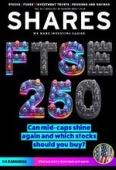Archived article
Please note that tax, investment, pension and ISA rules can change and the information and any views contained in this article may now be inaccurate.
Smithson suffers double whammy as shares and net asset value tumble

The interim trading statement from specialist small and mid-cap investment trust Smithson (SSON) doesn’t make for very happy reading from an investor’s viewpoint.
Not only did the company’s NAV (net asset value) drop 31.7%, lagging its global small- and mid-cap benchmark by a whopping 18 percentage points, but the stock slumped to an 11.5% discount to NAV taking the total share price return to -41.3% for the six months to June.
Manager Simon Barnard put the trust’s performance – the worst since its inception – down to three factors which hammered growth stocks in particular: inflation, rising interest rate expectations, and fears of recession.
Of these, the key factor affecting performance was interest rate expectations because the high-quality growth companies which the trust holds typically have higher ratings than the rest of the market, and this was certainly the case at the end of 2021.
As interest rate expectations rose, ‘the value of the future earnings of our companies, a substantial component of their overall valuation, became more heavily discounted’ explains Barnard.
The impact of inflation itself is less of a concern as the companies in the portfolio tend to have high gross margins, which means they can absorb cost increases, while their strong market positions means they can pass on price rises to their customers.
Unsurprisingly, the trust’s exposure to growth areas such as technology, industrial and consumer discretionary stocks cost it dear, while its lack of exposure to ‘value’ areas of the market such as energy and utilities, which made the biggest gains during the half, also held it back.
Among the biggest negative contributors to performance were Fevertree (FEVR:AIM), which accounted for 2.8% of the drop in NAV, Domino’s Pizza (DOM) and Rightmove (RMV), which accounted for 1.6% and 1.5% of the loss respectively, but Barnard is sticking with all three holdings, which reflects the long-term approach underpinning the trust.
Meanwhile, Barnard took advantage of price declines to add two new names to the portfolio, Italian luxury group Moncler (MONC:BIT) and Swedish industrial firm Addtech (ADDT-B:STO).
US boiler and heater maker AO Smith (AOS:NYSE) was sold after the managers became less optimistic on its ability to generate sustainable profit growth due to rising competition in markets like China.
While the average discount to NAV during the half was 3.5%, it widened to over 11% at the end of June prompting the board to start buying back shares.
By the end of June the trust had bought 0.5% of the shares in issue, and it added another 0.5% last month helping narrow the discount to 6.3%.
Disclaimer: The author of this article owns shares in Smithson Investment Trust
Important information:
These articles are provided by Shares magazine which is published by AJ Bell Media, a part of AJ Bell. Shares is not written by AJ Bell.
Shares is provided for your general information and use and is not a personal recommendation to invest. It is not intended to be relied upon by you in making or not making any investment decisions. The investments referred to in these articles will not be suitable for all investors. If in doubt please seek appropriate independent financial advice.
Investors acting on the information in these articles do so at their own risk and AJ Bell Media and its staff do not accept liability for losses suffered by investors as a result of their investment decisions.
Issue contents
Feature
- FTSE 250: Can UK mid caps shine again and which stocks should you buy?
- Why Chipotle’s red-hot pricing power has positive read-across for Tortilla
- Why companies who cross-sell have happy customers and investors
- Explaining economic moats and why investors are so keen to own businesses which have them
- Why companies which can lower the cost of doing business are well positioned
 magazine
magazine








